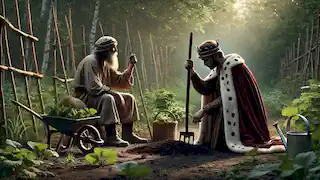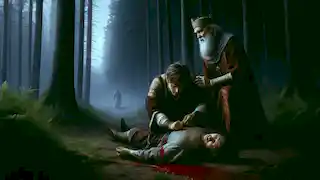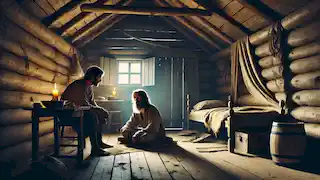Three Questions
Reading Time: 8 min

About Story: Three Questions is a Parable from russia set in the Medieval. This Simple tale explores themes of Wisdom and is suitable for All Ages. It offers Moral insights. A king’s search for wisdom leads him to life-changing truths about time, people, and kindness.
Once upon a time, there was a certain king who had three questions and thought that if he knew the answers to these three questions, he would never stray in any matter. The three questions were:
1. What is the right time to begin something?
2. Who are the right people to listen to?
3. What is the most important thing to do?
The king issued a decree throughout his kingdom, promising a great reward to anyone who could answer these questions. Many people came to the king, offering various answers to his questions, but they were all different, and none seemed satisfactory.
Some said that the king should prepare a timetable and follow it strictly to know the best time for every action. Others suggested that he could not determine the right time beforehand and should instead pay close attention to what was happening, avoiding idle pursuits and attending to all that was important. A few recommended he rely on a council of wise men to guide him on the best course of action. As for the second question, some advised that the king should keep his ministers close and heed their counsel, while others suggested it was the priests or the doctors who knew the most. Finally, for the third question, many opinions were given: some said that the most important thing was science; others, war; and still others, religious worship.
None of these answers satisfied the king. Therefore, he decided to visit a hermit who was known to be wise and who lived alone in the mountains. The hermit never left his dwelling and only received simple folk. So the king disguised himself as a common man, leaving behind his guards and attendants, and rode to see the hermit.
Upon arriving at the hermit’s hut, the king found him digging the ground in front of his hut. The hermit greeted him with a nod but continued his work.
"I have come to you, wise hermit," the king said, "to ask three questions. How can I learn the right time for every action? Who are the most necessary people, and what is the most important thing to do?"
The hermit listened carefully but said nothing. He continued digging. The king watched the old man labor, growing tired from the silence. After some time, he said, "You are tired, let me take the spade and work for a while."
The hermit thanked him, handed over the spade, and sat down on the ground. The king dug for some time, and when he had dug two beds, he stopped and repeated his questions. The hermit gave no answer, only stood and pointed to the spade, indicating the king should continue digging.
Several hours passed. The sun began to set behind the mountains, and the king finally stopped, feeling weary from his labor. "I came to you for answers, wise man," the king said, "but you have given me none. If you cannot answer my questions, just say so, and I will return to my kingdom."
"Look!" said the hermit. "Someone is coming."
The king turned and saw a man running toward them from the woods. The man clutched his stomach, from which blood was pouring. He stumbled and fell to the ground, unconscious.
The king and the hermit quickly went to his aid. They dressed the man's wound, using the king's handkerchief and a towel from the hermit's hut. They washed and bound the wound as best they could. When the man regained consciousness, he asked for water. The king fetched fresh water and gave it to him. Meanwhile, night had fallen, and the cool mountain air began to settle in. With the hermit's help, the king carried the injured man into the hut and laid him on the hermit's bed. Exhausted from the day’s work, the king fell asleep, sitting on the floor next to the bed.

When the king awoke the next morning, the man was lying in bed, gazing at him. "Forgive me!" the man said weakly.
"I do not know you, and there is nothing to forgive," the king replied.
"You do not know me, but I know you," the man said. "I am your enemy. I swore to avenge my brother's death and planned to kill you. When I heard you were coming to see the hermit alone, I set out to ambush you, but your guards saw me and wounded me. I escaped them and would have bled to death if you hadn’t helped me. Now, I am saved, and I owe my life to you. I am sorry for what I planned to do, and if I live, I will serve you faithfully for the rest of my days."
The king was glad to have made peace with an enemy so easily and to have gained a loyal friend. He forgave the man and promised to send his own physician to attend to him and his servants to take care of him. The wounded man was carried away to be treated.
Before leaving, the king once more turned to the hermit, asking again if he would answer his questions.
"Your questions have already been answered," the hermit said.
"How is that?" the king asked, confused.
"If you had not pitied my weakness yesterday and helped me dig those beds, you would have gone back and been attacked by that man. So the most important time was when you were digging the beds, and I was the most important man, and to do me good was your most important business. Later, when the wounded man ran to us, the most important time was when you were caring for him, for if you had not bound his wound, he would have died without making peace with you. So he was the most important man, and what you did for him was your most important business."
"Remember," the hermit continued, "there is only one important time: now. It is the most important because it is the only time we have any power. The most necessary person is the one with whom you are, for no one knows whether they will have dealings with anyone else. And the most important thing is to do good, because that is the purpose for which man was sent into this life."
The king stood silently, absorbing the wisdom of the hermit. He had received the answers he sought, but they were different from what he had expected.
He had thought that the right time for every action could be foreseen in advance, the right people identified by their importance, and the most important deeds prescribed by the needs of the moment. But instead, the hermit had taught him that the present moment is all that matters, and in that moment, one must do what is good for the people around them.
The king thanked the hermit and returned to his kingdom, a wiser man. He had learned that the secret to life was not found in elaborate plans or far-reaching decisions but in kindness, compassion, and doing what is right in the present.

For the rest of his reign, the king applied these teachings in his rule. Whenever he faced difficult decisions, he remembered the hermit’s words: “The most important time is now. The most important person is the one you are with. The most important thing is to do good.” With this wisdom in mind, he governed his kingdom with greater patience, humility, and understanding. He spent more time among his people, attending to their needs and listening to their concerns, knowing that the most crucial actions were not always grand gestures but simple acts of kindness performed in the present.
Many years later, when the king was old and nearing the end of his life, he reflected on how these simple truths had transformed his kingdom. His people were happier and more prosperous, and he himself was more at peace. He had gained a reputation as a wise and just ruler, but it was not the fame or fortune that brought him joy—it was knowing that he had lived a life of purpose, guided by the hermit’s teachings.

The hermit’s words spread beyond the kingdom, reaching distant lands and inspiring many others to adopt this philosophy of living in the present and doing good to those around them. The story of the king and the three questions became a legend, passed down from generation to generation, a reminder that the answers to life’s greatest questions are often simpler than we think.
And so, the king’s legacy lived on, not just in the laws he passed or the battles he won, but in the hearts of the people who followed his example. The lesson of the three questions continued to guide the lives of many, reminding them that the greatest wisdom lies not in power or wealth, but in compassion and kindness.
{{{_04}}}
As time went on, the king’s kingdom flourished, and his people remembered him as a ruler who had not only sought answers but who had lived by them. His story became a beacon of hope for those seeking purpose in their lives, a testament to the transformative power of living with intention and love for others.
Thus, the king’s quest for wisdom came full circle, and his kingdom remained a place of peace and harmony, where the values of compassion and the importance of the present moment were cherished for generations to come.

















